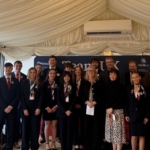Two reports published this week underline the centrality of skills for the future health of the UK economy. The EY Attractiveness Survey is an annual gauge of the UK’s ability to secure foreign direct investment (FDI) compared to the rest of Europe. FDI matters partly as it is a proxy for international confidence in the strength of an economy: in an increasingly globalised world, firms can invest in a variety of nations and regions, so if they actively choose the UK then it’s a major thumbs up; and partly because the enhanced innovation and productivity that FDI businesses such as Apple, Google, Boeing and Jaguar Land Rover bring really bolsters the overall strength of our economy by creating and maintaining jobs.
So it is encouraging that the UK retains its position as the number one European recipient of FDI, especially given all the Brexit uncertainty the economy has been exposed to over the past three years. But we can’t be complacent and there is a message from investors that rings loud and clear from the report: if we want to remain a leading contender, we must invest in skills. The most common response from investors regarding how the UK should maintain its attractiveness as a place to do business was a stark one: ‘improve the skill levels of the UK workforce’. This is significant especially as it comes ahead of other concerns such as support for foreign investors, reductions in corporation tax levels and incentives for research and development.
And hot on the heels of the EY Attractiveness Survey came the CBI’s new report into the digital economy. This report puts in laser focus the extent to which the UK needs the high tech skills of the future – and there are signs of a clear digital skills gap which needs tackling. Two thirds of UK firms have current unfilled vacancies and only a third are confident that they will be able to find the digital skills they need in the medium-term. And these skills are going to be urgently required given that CBI data shows huge medium-term growth is anticipated for digital skills. The UK’s attractiveness for FDI is in no small part built on its EU pre-eminence in the digital arena – so lose this and pound-for-pound we are less of a prospect in what is a globally competitive market.
What both reports demonstrate is the need for forward planning. At WorldSkills UK, we are on the front foot when it comes to the skills of the future. We’ve expanded our portfolio so that it aligns with Industrial Strategy needs and includes key digital skills such as cybersecurity, cloud computing and lab tech. We are refreshing this portfolio ongoing with industrial robotics, for example, being added soon. And we’ve been focusing our dialogue with our partners in business and the skills on tech developments, particularly in engineering and construction.
But we have to do more as the UK to raise our game in such internationally competitive sectors to avoid leaving ourselves exposed. The establishment of the WorldSkills UK Productivity Lab is a way of benchmarking ourselves globally with major economic competitors through the WorldSkill global platform. At the skills Olympics in Kazan, Russia this summer we will be competing for the first time in skills such as cybersecurity and cloud computing. This benchmarking exercise will be keenly watched to see how our training standards perform internationally and will send a signal about the quality of our skills development which will be read by investors. As the report we recently launched with colleagues at the RSA and FETL demonstrates, we have a lot to learn from what other countries, like Russia and China, are already doing well. If we can successfully integrate the WorldSkills world-class standards into UK training and development systems, we can improve skills capacity across the economy – including digital, engineering and construction, while giving our productivity and competitiveness levels a much-needed boost.
If we want to secure our position as a world-leader and keep inward investment flowing, we need to do three things: inspire our young people to pursue the kinds of careers that are going to benefit themselves and the economy in the long run; work with business to respond to their changing needs; and learn from the world’s best and mainstream that learning to improve our competitiveness. WorldSkills UK has these principles at its core and is working with its partners in governments, business and education to really help keep the UK ahead of the competition.


